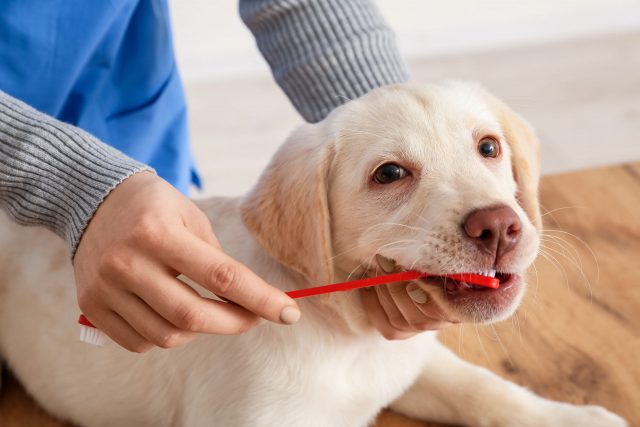As a dog owner, chances are you’ve noticed a foul scent coming from your pup’s mouth from time to time. If this foul smell is not resolved by brushing and has become a chronic issue, you may want to consider the reason why.
Here’s what you should know about bad breath in dogs and what causes it. However, you may still need to visit your veterinarian to get a proper diagnosis for your dog’s bad breath.
Why Is My Dog’s Breath Like Sewage?
There are many reasons why your dog’s breath might smell like a city sewer on a hot day. In some cases, the culprit is simple and relatively harmless.
- Something they ate: Dogs often eat like a garbage disposal, chomping away at anything and everything. This can lead to some funky scents escaping from either end from time to time. The good news is brushing often resolves the issue in this instance.
- Bacteria buildup: When we forget to brush our dog’s teeth regularly (because, yes, we should be doing that), their teeth can become a breeding ground for bacteria. Bacteria can also be the culprit of bad breath if there is an imbalance of bacteria in your dog’s gut.
- Dental disease: When we go extended periods without brushing our dog’s teeth, that bacteria build-up can lead to an even bigger problem… dental disease.
While these are a few of the less concerning causes of bad breath in dogs, bad breath can also be a symptom of a more serious health issue. So, when is bad breath in dogs a sign of illness? If your dog’s stinky breath is not the sole symptom, check in with your vet as soon as possible. If you ever have concerns about your dog’s health, contact your veterinarian as soon as possible.
What Does A Dog’s Breath Smell Like With Kidney Disease?
Kidney disease can cause breath that smells like ammonia or may be described as “fishy.” When dogs lose the ability to eliminate urea and nitrogen waste from their blood due to kidney disease or failure, this leads to the development of uremia. Uremia causes urine-like odors when saliva converts the product of urea to ammonia. This might also cause a metallic taste, which could lead to excessive licking.
What Are The First Signs Of Kidney Failure In A Dog?
Kidney disease could ultimately lead to kidney failure, which can be fatal. If you notice any early signs of kidney failure in a dog, such as rapid weight loss, pale gums, stumbling, or vomiting, check in with your veterinarian as soon as possible.
Can Liver Problems In Dogs Cause Bad Breath?
Another serious health condition that can cause some awful dog breath can stem from underlying liver problems. Bad breath that is caused by a problem with the liver is often described as smelling like a dead animal. If your dog’s liver is struggling to filter out toxins as it should, the smell of those toxins essentially escapes through their mouth. This toxin buildup can also cause musty-smelling skin as well.
What Are The Signs Of Liver Disease In Dogs?
Other symptoms of liver disease in dogs that may present alongside bad breath include jaundice or yellowing of the eyes, neurological problems, decreased appetite, vomiting, diarrhea, and noticeable bloating. With or without bad breath, these symptoms should be cleared by your veterinarian.
Can Infection Cause Bad Breath In Dogs?
Infection can be another source of bad breath in dogs. Infections of the mouth are common culprits, ranging from tooth infections to infections in the folds of the lip. Bacteria buildup can happen virtually anywhere, but brushing your dog’s teeth and giving them dental chews occasionally can help to keep mouth infections at bay.
Respiratory infections can be another source of foul-smelling breath in dogs. When your pup has a respiratory infection, a buildup of mucus in their throat can be a source of some pretty awful smells. If your dog’s nose is stuffed up due to a respiratory infection, they also may breathe through their mouth more often, causing some extra breathy panting.
What Are The Signs And Symptoms Of Respiratory Infection In Dogs?
If you’re worried that your dog may be developing a respiratory infection, keep an eye out for symptoms like sneezing, abnormal breathing, foaming at the mouth, decreased appetite, extreme fatigue, or a cough.
Do Old Dogs Have Bad Breath?
It is quite common for old dogs to have bad breath. The most common cause of bad breath in senior dogs is tooth and gum disease. Poor oral hygiene throughout an older dog’s lifetime can lead to build-up of bacteria and periodontal disease.
Additionally, older dogs tend to have more health issues. So, as your dog creeps closer to senior status, be extra mindful of any symptoms accompanying their bad breath.
Why Does My 14-Year-Old Dog Have Bad Breath?
It’s challenging to think about, but 14 years old is towards the end of an average lifespan for most dogs. If your 14-year-old dog has bad breath, it may be a combination of health issues and a buildup of bacteria and tartar.
Does Lymphoma Give Dogs Bad Breath?
If lymphoma cancer is present in or near your dog’s mouth, the tumor(s) can cause bad breath. Additionally, if lymphoma is present in the lungs or affects breathing, that can contribute to bad breath in dogs as well.
What Does Ketoacidosis Breath Smell Like?
Ketoacidosis is a complication of diabetes and can result in some pretty bad breath in dogs. Ketoacidosis breath can be described as fruity, acidic, or sweet smelling. Ketoacidosis can be life-threatening. If your dog’s bad breath smells like sweet fruit, have your dog checked by a veterinarian immediately.
How Do You Fix Rotten Dog Breath?
If prevention is a day late and a dollar short, there are ways to fix rotten dog breath. Determining the source of your dog’s bad breath is going to be the key factor in reducing or curing their offensive smell.
- Oral hygiene: If your dog’s bad breath is caused by poor oral hygiene, brushing their teeth is going to be the number one fix.
- Health issues: If your dog’s bad breath is disease related, talk to your vet about ways to manage their health.
- Gut health: When your dog’s bad breath comes from their stomach due to unbalanced bacteria, a probiotic like iHeartDogs 3-In-1 Probiotic Dog Chews with Pumpkin for Improved Digestion and Gut Health can help.
Bad breath in dogs is painfully common. Keeping in mind that prevention is key, in most cases, it is manageable. So, don’t fret, the days where you don’t dread those stinky kisses may soon pass.
How Do You Treat Dog Breath That Smells Like Poop?
The last thing we want as dog owners is a big wet kiss that smells reminiscent of a portapotty. Luckily there are some treatment options for dog breath that smells like poop.
So, what is the best way to treat bad dog breath? Prevention.
Since oral hygiene is the number one contributor to bad dog breath, ensuring that your pup’s teeth and mouth are properly cared for can mitigate the risks of poop breath. Brushing, dental chews such as iHeartDogs Brushy Sticks, homemade dog water additives for bad breath, treats for bad breath, and cleaning toys like our Fresh Mint Scented Brushing Dog Bone Toy are all great ways to keep Fido’s mouth clean. When you shop iHeartDogs, you can support a brand that’s passionate about dogs. We do everything we can to give back to doggos in need. Your support helps us extend support to shelters in the form of blankets, food, and other generous donations. Because every dog matters, shop iHeartDogs for safe and effective products for your dog, while supporting a brand that helps other dogs in need too.




 Toledo, United States.
Toledo, United States.
